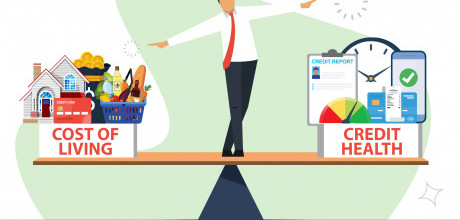Beware of credit repair companies
Is that fix for real?
Have you seen ads for companies promising to "clean" your credit report or remove negative listings for a fee? This is called credit repair.
While the idea of a quick fix is tempting, it's important to know the facts. You can manage and improve your own credit health, and you never have to pay to fix errors on your credit report.
If you find a mistake on your credit report—like an account that isn't yours or an incorrect default listing—you have the right to have it investigated and corrected for free. You can have errors fixed for free by simply contacting your credit provider or the credit reporting bodies. To find out how to fix errors on your credit report click here.
You don't need a paid service to do this for you. Both the credit provider (like the bank or lender) and the credit reporting body (like Equifax, Experian, or illion) are legally required to help you.
Warning signs: How to spot a dodgy operator
Predatory credit repair companies often make big promises and use high-pressure sales tactics. Be wary if a company:
- Asks for payment upfront before they do any work.
- Guarantees they can remove negative information, even if it's correct. (Remember: if information is accurate, it can't be legally removed).
- Charges high fees for no real result, leaving you thousands of dollars out of pocket.
- Locks you into unfair contracts with large fees if you try to cancel.
- Pressures you into insolvency or bankruptcy options that aren’t suitable for your situation.
- Tells you not to contact credit reporting bodies or providers yourself.
- Doesn't explain your rights or the free options available to you.
You are in control of your credit health
The best person to improve your credit health is you. There are no quick fixes but by making repayments on time, reaching out for help early when you’re experiencing financial hardship and not taking on credit you can’t afford, you can start improving your credit health right now.
Simple steps to improve your credit health:
- Pay your bills on time: Your repayment history is a key part of your credit report. Setting up direct debits or payment reminders can help.
- Check your credit report regularly: You can get a free copy of your report from each of the main credit reporting bodies every three months. This helps you spot any errors early.
- Lower your credit limits and close accounts you don’t need: Lenders look at your total available credit, so lowering the limit on credit you don't use much or closing credit or buy now, pay later accounts you no longer need, can be a positive step.
- Only apply for credit when you need it: Every application is listed on your report, and too many in a short space of time may reduce your credit score.
How to fix an error on your report (For free)
Found a mistake? Get it fixed for free!
- Contact the lender: Start by contacting the lender or company that supplied the incorrect information. Provide them with any evidence you have. They must investigate and respond to your request.
- Contact the Credit Reporting Body: You can also raise the dispute directly with the credit reporting body that has the error on its file. They will investigate the matter with the credit provider.
- Not happy? If you're not happy with the outcome, or if you don't get a response, you can lodge a complaint with the Australian Financial Complaints Authority (AFCA). Their service is independent, fair, and free for consumers.
Where to Get Free, Trustworthy Help
If you're struggling with debt or need advice on your finances, you don't have to go it alone. The following services are free, confidential, and can provide expert help:
- National Debt Helpline: Call 1800 007 007 to speak with a financial counsellor.
- Financial Counselling Australia: Visit their website to find a free financial counsellor in your area.
These professionals can help you understand your options, negotiate with lenders, and get your finances back on track—all without charging you a fee.
-
What is Easy English?
Easy English is a style of writing that has been developed to provide understandable and concise information for people with low English literacy. Many people find it hard to read and understand everyday written information. Easy English is similar to plain language in that it's concise and easy to understand, but it also follows specific grammatical rules and includes images to support key messages.Each Easy English document will:
- Explain one idea per sentence
- Use basic language and grammar
- Use subheadings, bullet points and white space to break up text
- Use a simple font, layout and design
- Select images that are easily understood and add meaning to the text



